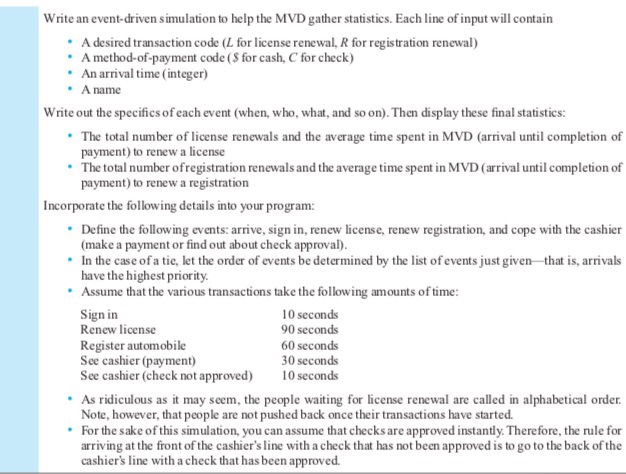Answered step by step
Verified Expert Solution
Question
1 Approved Answer
3. (Carrano) Implement Programming Problem #8 p. 394. Use the structure of Priority Queue Cap 14. In its implementation. You have to create the main.
3. (Carrano) Implement Programming Problem #8 p. 394. Use the structure of Priority Queue Cap 14. In its implementation.
You have to create the main.
LinkedList.h
#ifndef _LINKED_LIST
#define _LINKED_LIST
#include "ListInterface.h"
#include "Node.h"
#include "PrecondViolatedExcep.h"
template
class LinkedList : public ListInterface
{
private:
Node* headPtr; // Pointer to first node in the chain;
// (contains the first entry in the list)
int itemCount; // Current count of list items
// Locates a specified node in this linked list.
// @pre position is the number of the desired node;
// position >= 1 and position
// @post The node is found and a pointer to it is returned.
// @param position The number of the node to locate.
// @return A pointer to the node at the given position.
Node* getNodeAt(int position) const;
public:
LinkedList();
LinkedList(const LinkedList& aList);
virtual ~LinkedList();
bool isEmpty() const;
int getLength() const;
bool insert(int newPosition, const ItemType& newEntry);
bool remove(int position);
void clear();
/** @throw PrecondViolatedExcep if position
position > getLength(). */
ItemType getEntry(int position) const throw(PrecondViolatedExcep);
/** @throw PrecondViolatedExcep if position
position > getLength(). */
void setEntry(int position, const ItemType& newEntry)
throw(PrecondViolatedExcep);
}; // end LinkedList
#include
template
LinkedList::LinkedList() : headPtr(nullptr), itemCount(0)
{
} // end default constructor
template
LinkedList::LinkedList(const LinkedList& aList) : itemCount(aList.itemCount)
{
Node* origChainPtr = aList.headPtr; // Points to nodes in original chain
if (origChainPtr == nullptr)
headPtr = nullptr; // Original list is empty
else
{
// Copy first node
headPtr = new Node();
headPtr->setItem(origChainPtr->getItem());
// Copy remaining nodes
Node* newChainPtr = headPtr; // Points to last node in new chain
origChainPtr = origChainPtr->getNext(); // Advance original-chain pointer
while (origChainPtr != nullptr)
{
// Get next item from original chain
ItemType nextItem = origChainPtr->getItem();
// Create a new node containing the next item
Node* newNodePtr = new Node(nextItem);
// Link new node to end of new chain
newChainPtr->setNext(newNodePtr);
// Advance pointer to new last node
newChainPtr = newChainPtr->getNext();
// Advance original-chain pointer
origChainPtr = origChainPtr->getNext();
} // end while
newChainPtr->setNext(nullptr); // Flag end of chain
} // end if
} // end copy constructor
template
LinkedList::~LinkedList()
{
clear();
} // end destructor
template
bool LinkedList::isEmpty() const
{
return itemCount == 0;
} // end isEmpty
template
int LinkedList::getLength() const
{
return itemCount;
} // end getLength
template
bool LinkedList::insert(int newPosition, const ItemType& newEntry)
{
bool ableToInsert = (newPosition >= 1) && (newPosition
if (ableToInsert)
{
// Create a new node containing the new entry
Node* newNodePtr = new Node(newEntry);
// Attach new node to chain
if (newPosition == 1)
{
// Insert new node at beginning of chain
newNodePtr->setNext(headPtr);
headPtr = newNodePtr;
}
else
{
// Find node that will be before new node
Node* prevPtr = getNodeAt(newPosition - 1);
// Insert new node after node to which prevPtr points
newNodePtr->setNext(prevPtr->getNext());
prevPtr->setNext(newNodePtr);
} // end if
itemCount++; // Increase count of entries
} // end if
return ableToInsert;
} // end insert
template
bool LinkedList::remove(int position)
{
bool ableToRemove = (position >= 1) && (position
if (ableToRemove)
{
Node* curPtr = nullptr;
if (position == 1)
{
// Remove the first node in the chain
curPtr = headPtr; // Save pointer to node
headPtr = headPtr->getNext();
}
else
{
// Find node that is before the one to delete
Node* prevPtr = getNodeAt(position - 1);
// Point to node to delete
curPtr = prevPtr->getNext();
// Disconnect indicated node from chain by connecting the
// prior node with the one after
prevPtr->setNext(curPtr->getNext());
} // end if
// Return node to system
curPtr->setNext(nullptr);
delete curPtr;
curPtr = nullptr;
itemCount--; // Decrease count of entries
} // end if
return ableToRemove;
} // end remove
template
void LinkedList::clear()
{
while (!isEmpty())
remove(1);
} // end clear
template
ItemType LinkedList::getEntry(int position) const throw(PrecondViolatedExcep)
{
// Enforce precondition
bool ableToGet = (position >= 1) && (position
if (ableToGet)
{
Node* nodePtr = getNodeAt(position);
return nodePtr->getItem();
}
else
{
string message = "getEntry() called with an empty list or ";
message = message + "invalid position.";
throw(PrecondViolatedExcep(message));
} // end if
} // end getEntry
template
void LinkedList::setEntry(int position, const ItemType& newEntry) throw(PrecondViolatedExcep)
{
// Enforce precondition
bool ableToSet = (position >= 1) && (position
if (ableToSet)
{
Node* nodePtr = getNodeAt(position);
nodePtr->setItem(newEntry);
}
else
{
string message = "setEntry() called with an invalid position.";
throw(PrecondViolatedExcep(message));
} // end if
} // end setEntry
template
Node* LinkedList::getNodeAt(int position) const
{
// Debugging check of precondition
assert((position >= 1) && (position
// Count from the beginning of the chain
Node* curPtr = headPtr;
for (int skip = 1; skip
curPtr = curPtr->getNext();
return curPtr;
} // end getNodeAt
// End of implementation file.
#endif
ListInterFace.h
#ifndef _LIST_INTERFACE
#define _LIST_INTERFACE
template
class ListInterface
{
public:
/** Sees whether this list is empty.
@return True if the list is empty; otherwise returns false. */
virtual bool isEmpty() const = 0;
/** Gets the current number of entries in this list.
@return The integer number of entries currently in the list. */
virtual int getLength() const = 0;
/** Inserts an entry into this list at a given position.
@pre None.
@post If 1
successful, newEntry is at the given position in the list,
other entries are renumbered accordingly, and the returned
value is true.
@param newPosition The list position at which to insert newEntry.
@param newEntry The entry to insert into the list.
@return True if insertion is successful, or false if not. */
virtual bool insert(int newPosition, const ItemType& newEntry) = 0;
/** Removes the entry at a given position from this list.
@pre None.
@post If 1
the entry at the given position in the list is removed, other
items are renumbered accordingly, and the returned value is true.
@param position The list position of the entry to remove.
@return True if removal is successful, or false if not. */
virtual bool remove(int position) = 0;
/** Removes all entries from this list.
@post List contains no entries and the count of items is 0. */
virtual void clear() = 0;
/** Gets the entry at the given position in this list.
@pre 1
@post The desired entry has been returned.
@param position The list position of the desired entry.
@return The entry at the given position. */
virtual ItemType getEntry(int position) const = 0;
/** Replaces the entry at the given position in this list.
@pre 1 

8 The people who run the Motorvehicle Department (MVD ) have a problem. They are concerned that people do not spend cnough time waiting in lines to appreciate the privilege of owning and driving an automobile. The current arrangement is as follows: When people walk in the door, they must wait in a line to sign in. Once they have signed in, they are told either to stand in line for registration renewal or to wait until they are called for license renewal. Once they have completed their desired transaction, they must go and wait in line for the cashier. When they finally get to the front of the cashier's line, if they expect to pay by check, they are told that all checks must get approved. To do this, it is necessary to go to the check-approver's table and then reenter the cashier's line at the encd @post The entry at the given position is newEntry.
@param position The list position of the entry to replace.
@param newEntry The replacement entry. */
virtual void setEntry(int position, const ItemType& newEntry) = 0;
}; // end ListInterface
#endif
ListQueue.h
#ifndef _LIST_QUEUE
#define _LIST_QUEUE
#include "QueueInterface.h"
#include "LinkedList.h"
#include "PrecondViolatedExcep.h"
template
class ListQueue : public QueueInterface
{
private:
LinkedList* listPtr; // Pointer to list of queue items
public:
ListQueue();
ListQueue(const ListQueue& aQueue);
~ListQueue();
bool isEmpty() const;
bool enqueue(const ItemType& newEntry);
bool dequeue();
/** @throw PrecondViolatedExcep if queue is empty. */
ItemType peekFront() const throw(PrecondViolatedExcep);
}; // end ListQueue
template
ListQueue::ListQueue()
{
listPtr = new LinkedList();
} // end default constructor
template
ListQueue::ListQueue(const ListQueue& aQueue)
{
// First, create our own list
listPtr = new LinkedList();
// Then add items to it using public methods
for (int position = 1; position getLength(); position++)
{
listPtr->insert(position, aQueue.listPtr->getEntry(position));
} // end for
} // end copy constructor
template
ListQueue::~ListQueue()
{
} // end destructor
template
bool ListQueue::isEmpty() const
{
return listPtr->isEmpty();
} // end isEmpty
template
bool ListQueue::enqueue(const ItemType& newEntry)
{
return listPtr->insert(listPtr->getLength() + 1, newEntry);
} // end enqueue
template
bool ListQueue::dequeue()
{
return listPtr->remove(1);
} // end dequeue
template
ItemType ListQueue::peekFront() const throw(PrecondViolatedExcep)
{
if (isEmpty())
throw PrecondViolatedExcep("peekFront() called with empty queue.");
// Queue is not empty; return front
return listPtr->getEntry(1);
} // end peekFront
// End of implementation file.
#endif
Node.h
#ifndef _NODE
#define _NODE
template
class Node
{
private:
ItemType item; // A data item
Node* next; // Pointer to next node
public:
Node();
Node(const ItemType& anItem);
Node(const ItemType& anItem, Node* nextNodePtr);
void setItem(const ItemType& anItem);
void setNext(Node* nextNodePtr);
ItemType getItem() const;
Node* getNext() const;
}; // end Node
#include
template
Node::Node() : next(nullptr)
{
} // end default constructor
template
Node::Node(const ItemType& anItem) : item(anItem), next(nullptr)
{
} // end constructor
template
Node::Node(const ItemType& anItem, Node* nextNodePtr) :
item(anItem), next(nextNodePtr)
{
} // end constructor
template
void Node::setItem(const ItemType& anItem)
{
item = anItem;
} // end setItem
template
void Node::setNext(Node* nextNodePtr)
{
next = nextNodePtr;
} // end setNext
template
ItemType Node::getItem() const
{
return item;
} // end getItem
template
Node* Node::getNext() const
{
return next;
} // end getNext
#endif
PrecondViolatedExcep.h
#ifndef _PRECOND_VIOLATED_EXCEP
#define _PRECOND_VIOLATED_EXCEP
#include
#include
using namespace std;
class PrecondViolatedExcep : public logic_error
{
public:
PrecondViolatedExcep(const string& message = "");
}; // end PrecondViolatedExcep
PrecondViolatedExcep::PrecondViolatedExcep(const string& message) : logic_error("Precondition Violated Exception: " + message)
{
} // end constructor
// End of implementation file.
#endif
QueueInterface.h
#ifndef _QUEUE_INTERFACE
#define _QUEUE_INTERFACE
template
class QueueInterface
{
public:
/** Sees whether this queue is empty.
@return True if the queue is empty, or false if not. */
virtual bool isEmpty() const = 0;
/** Adds a new entry to the back of this queue.
@post If the operation was successful, newEntry is at the
back of the queue.
@param newEntry The object to be added as a new entry.
@return True if the addition is successful or false if not. */
virtual bool enqueue(const ItemType& newEntry) = 0;
/** Removes the front of this queue.
@post If the operation was successful, the front of the queue
has been removed.
@return True if the removal is successful or false if not. */
virtual bool dequeue() = 0;
/** Returns the front of this queue.
@pre The queue is not empty.
@post The front of the queue has been returned, and the
queue is unchanged.
@return The front of the queue. */
virtual ItemType peekFront() const = 0;
}; // end QueueInterface
#endif


Step by Step Solution
There are 3 Steps involved in it
Step: 1

Get Instant Access to Expert-Tailored Solutions
See step-by-step solutions with expert insights and AI powered tools for academic success
Step: 2

Step: 3

Ace Your Homework with AI
Get the answers you need in no time with our AI-driven, step-by-step assistance
Get Started


